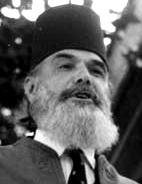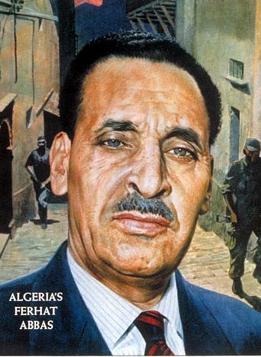French Colonization: For over 300 years Algeria was an autonomous province of the Ottoman Empire – after the empire helped overthrow Spanish captivity of Algeria in 1518. The autonomous Algeria was very powerful, with a fleet that ruled all the Mediterranean while European nations payed taxes to cross it – those who refused to recognize Algeria’s claim to the sea would have their ships captured and ransomed off. As capitalism advanced throughout Europe, international trade began to slowly develop in earnest, and property claims over water was a fundamental enemy. In 1815, the United States sent a fleet across the Atlantic to battle Algeria, with mixed results. The following year the English and Dutch sent a second, combined fleet to crush Algerian might – but were unable to beat algerian tactical supremacy. In 1830, the French invaded and successfully suppressed Algeria, capturing the capital port city of Algeirs and by 1834, Algeria was annexed as a colony of France.
Under French domination, Algerians could not hold public meetings nor even leave their homes without permission. French state racism kept Algerians at the bottom of society, working as servants, unskilled labourers and peasants, while only French citizens or other whites were allowed skilled jobs and positions in the social institutions (from the police to the government).
 After the Russian Revolution, the Algerian Communist Ahmed Messali Hadj began underground struggles to build a revolutionary movement to overthrow French Colonialism. By the second world war, Ferhat Abbas, once a well-known Algerian social-democratic reformist, became a Communist and joined with Hadj to build a militant workers party – Friends of the Manifesto and Liberty.
After the Russian Revolution, the Algerian Communist Ahmed Messali Hadj began underground struggles to build a revolutionary movement to overthrow French Colonialism. By the second world war, Ferhat Abbas, once a well-known Algerian social-democratic reformist, became a Communist and joined with Hadj to build a militant workers party – Friends of the Manifesto and Liberty.See Messali Hadj Archive.
See Nothing is Lost, from Alger Républicain, June 1945
and Common Declaration of the Socialist and Communist Parties of Algiers, 1945
and Common Declaration of the Socialist and Communist Parties of Algiers, 1945
Ouradour-sur-Glane in Algeria, Ohé Partisans! No. 4 August 1945
 In March of 1954, Ahmed Ben Bella, an ex-sergeant in the French army who was deported to Egypt for his leftist political beliefs, joined eight other Algerian exiles to form what would become the National Liberation Front (FLN). On November 1, 1954, just a few months after it’s creation, the FLN heroically began coordinated attacks on government buildings, military and police posts, and communications installations.
In March of 1954, Ahmed Ben Bella, an ex-sergeant in the French army who was deported to Egypt for his leftist political beliefs, joined eight other Algerian exiles to form what would become the National Liberation Front (FLN). On November 1, 1954, just a few months after it’s creation, the FLN heroically began coordinated attacks on government buildings, military and police posts, and communications installations.See the Editorial in the first issue of “El Moudjahid”, published by the FLN in 1956,
Why the Communist Voted in Favor of the Government, Jacques Duclos, March 1956
Ali-la-Pointe, hero of the battle of Algiers
and Letter to the Europeans of Algeria, Algerian Communist Party, October 1957.
Why the Communist Voted in Favor of the Government, Jacques Duclos, March 1956
Ali-la-Pointe, hero of the battle of Algiers
and Letter to the Europeans of Algeria, Algerian Communist Party, October 1957.
Not all French people turned their backs on the Algerians however. There were “pied-noir” (European Algerians) who supported the liberation war, and one of these was Fernand Iveton.
In less than a year however, de Gaulle openly announced his association with the French government, and explained that the only way out was a tactical retreat – giving in to demands for free elections. French settlers unsuccessfully tried again to overthrow General de Gaulle, including terrorist attacks in Paris, while their genocidal war against the FLN and Algerians continued.
- Open Letter from Henri Maillot, 4 April 1956
- Appeal of the FLN to Our Israelite Compatriots, 1 October 1956
- Save Djamila Bouhired, April 1958
- Minutes of a Meeting between the FLN and the PCF, 30 May 1958
- “Manifesto of the 121,” published by French independent Leftists, Aug 1960
- The 121, La Vérité des Travailleurs, #111, December 1960
- Ben Bella’s response
- Letter of the FLN to the Harkis, 14 July 1960.
- Declaration of the Michel Pablo and Sal Santen Support Committee, November 1960.
- A First-Hand Account of Torture, by Omar Hamadi, 5 December 1960
- Letter of the French Federation of the FLN, 10 October 1961
- The Massacre of 17 October 1961
- Appeal to the French, 22 October 1961
- To the Israelites of Algeria, FLN-ALN General Staff 1962
- The Crémieux Decree declaring the Jews native to Algeria to be French citizens, 1870
See Algeria and the defeat of French Humanism,
The Arab Revolution, Michael Pablo November 1958, Preface, June 1959, and
Alain Krivine on Algeria, 1956-62.
My Discovery of Algeria, by Henri Alleg
In March of 1962, a cease-fire was established: by July a nation-wide referendum was held with the Algerian people voting overwhelmingly for independence, with presidential elections scheduled for September.
The Arab Revolution, Michael Pablo November 1958, Preface, June 1959, and
Alain Krivine on Algeria, 1956-62.
My Discovery of Algeria, by Henri Alleg